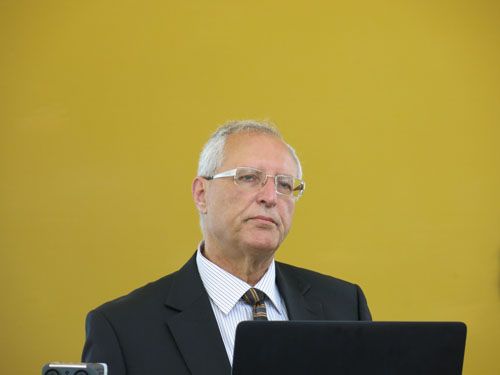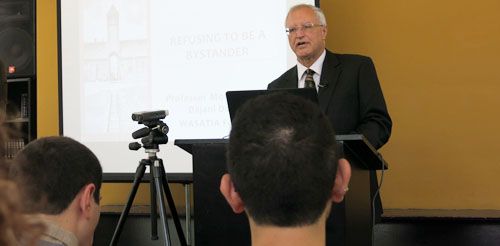Mohammed Dajani Speaks on Refusing to be a Bystander

Dajani is a political science professor at al-Quds University in Jerusalem and the founder of the Wasatia movement of moderate Islam. He is the founding director of the Jerusalem Studies and Research Institute, chair of the board of directors of the House of Water and Environment in Ramallah, and a member of the board of directors of the YMCA, Jerusalem. He has written extensively on Arab culture and politics, including an International Herald Tribune op-ed he co-authored with Washington Institute executive director Robert Satloff titled Why Palestinians Should Learn About the Holocaust.
Earlier this year, Dajani made headlines when Palestinian and Israeli media reported on the trip to Poland he took with 30 Palestinian students, in which he brought the students to Auschwitz and other concentration camps to learn about the Holocaust. Palestinian media attacked him, accusing him of attempting to brainwash his students or turn them into Zionists, and he was fired by his union.
Dajani titled his talk at USC “Refusing to be a Bystander,” and, indeed, his message throughout was simple: He teaches his students about the Holocaust because it is the right thing to do, and you have to do what is right.
“The Holocaust did not begin with the concentration camps,” Dajani said. “Only when good people decide not to be bystanders is evil crushed.”
Dajani said that in his culture, the Holocaust is ignored and shunned to the point that it has become taboo to talk about it. Palestinians compare it to the Nakba, when hundreds of thousands of Palestinians fled or were expelled from their homes when Israel was founded in 1948, and many are anti-Semitic. The history of the Holocaust has become “tainted with politics,” Dajani said.
“This to me was extremely sad. I felt as an educator I should try to do something about it,” he said.
Dajani embarked on a five-year project called Hearts of Flesh – Not Stone with Tel Aviv University and Friedrich-Schiller University in Germany to study reconciliation, empathy and tolerance in Israelis and Palestinians. The study aims to answer the question “What impact does knowledge about the suffering of others teach us about empathy?”
As part of the project, Palestinian students went to Auschwitz and Israeli students visited Palestinian refugee camps. They all completed pre- and post-trip surveys to capture how they might have changed as a result of the trips.
Dajani noted that he received 70 applications from students wanting to go to Poland, though he could only take half.
News of Dajani’s trip to Auschwitz broke just as he and the students were leaving, and he immediately came under attack by Palestinian media and even the students at his university. He was fired from his union and today is unable to teach.

But, he said, he will not be silent or allow his opponents to win. He continues to speak out in defense of his actions and knows he has the “silent majority” behind him, even if they are afraid to speak up against radicalism.
Dajani ended the talk by summing up his reasons for teaching the Holocaust, among them: respect for the truth; it’s the right thing to do; Holocaust denial is historically wrong and morally unacceptable; we must learn the tragic lessons of the past to avoid their recurrence; and we must understand evil in order to understand the meaning of good. He also said it’s important for people to put themselves in the shoes of the victims of the Holocaust and experience what it was really like to be there. This helps them understand the big picture, not simply compare it to the Nakba.
He said he tells his students, “Never mind what others do, you do the right thing.”
At the end of the talk, one student in the audience asked Dajani what gives him the motivation to go on in the face of such opposition.
“I am an educator,” Dajani said. “That’s my business and that’s what I love doing.”